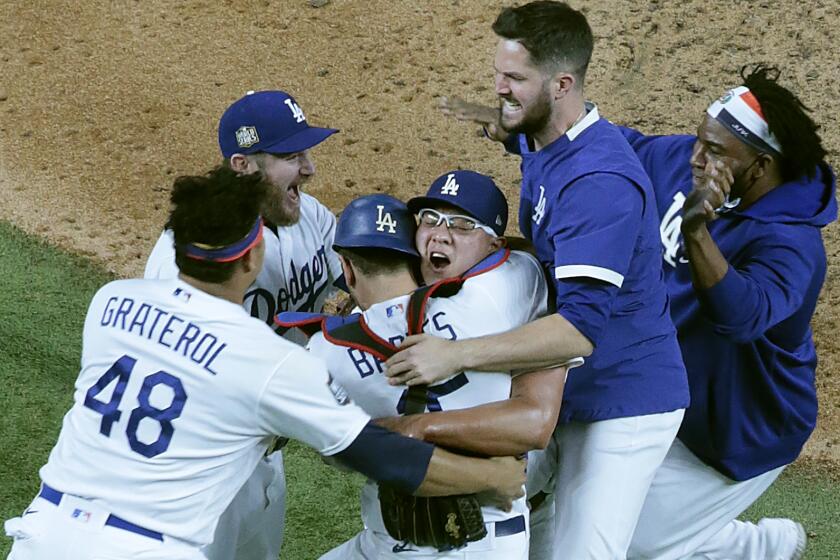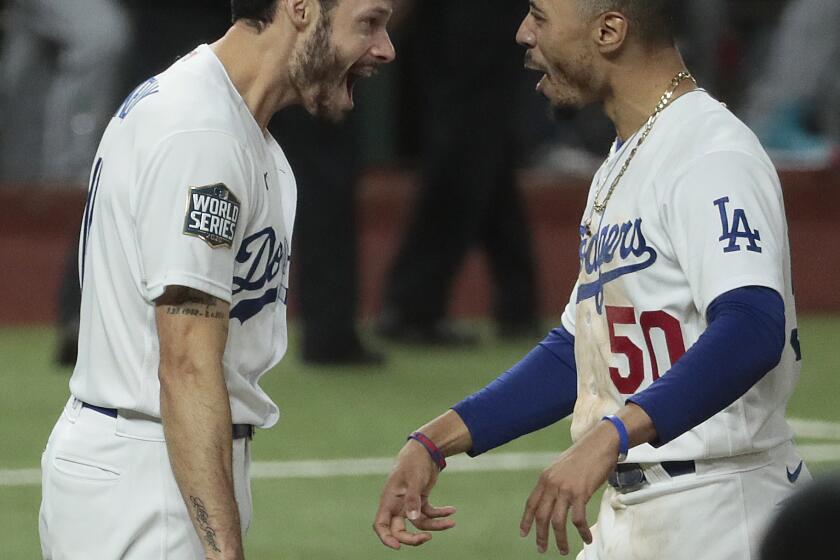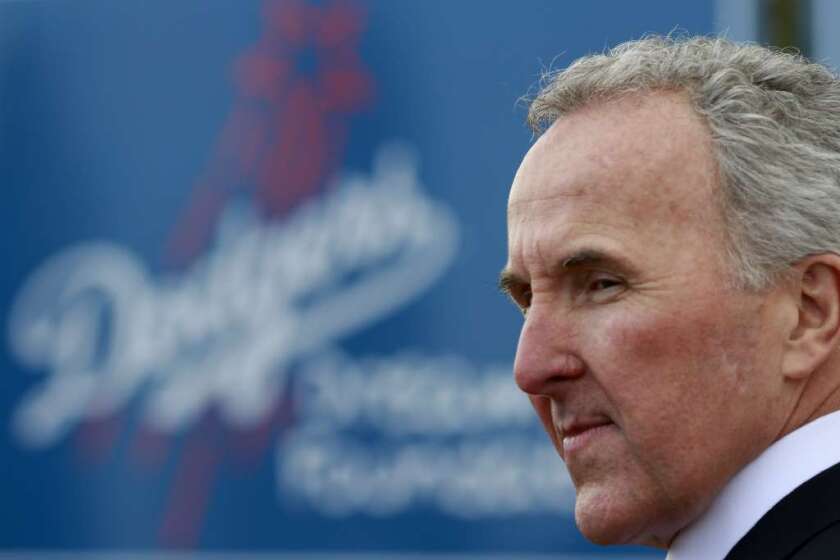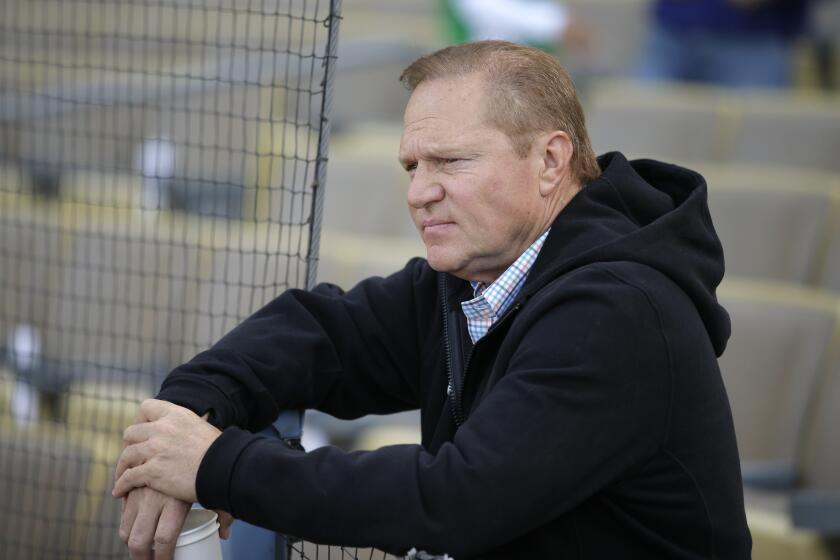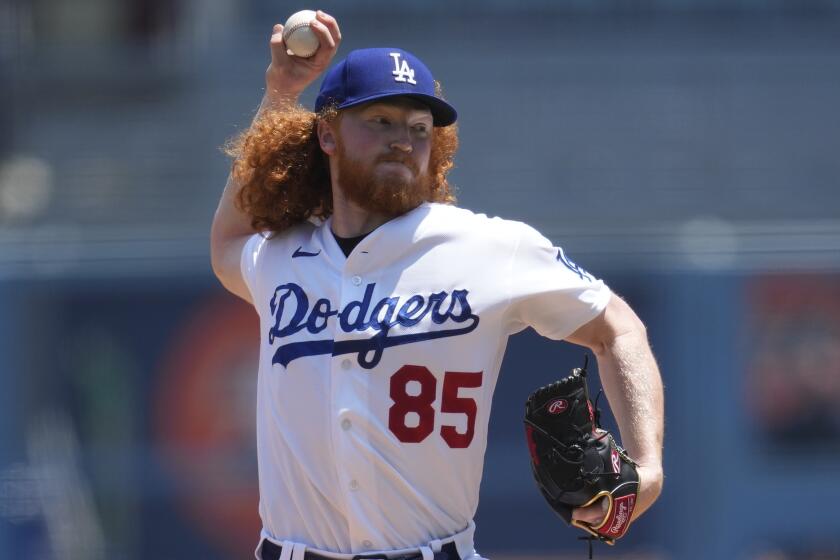Path to the World Series title: How the Dodgers won the championship
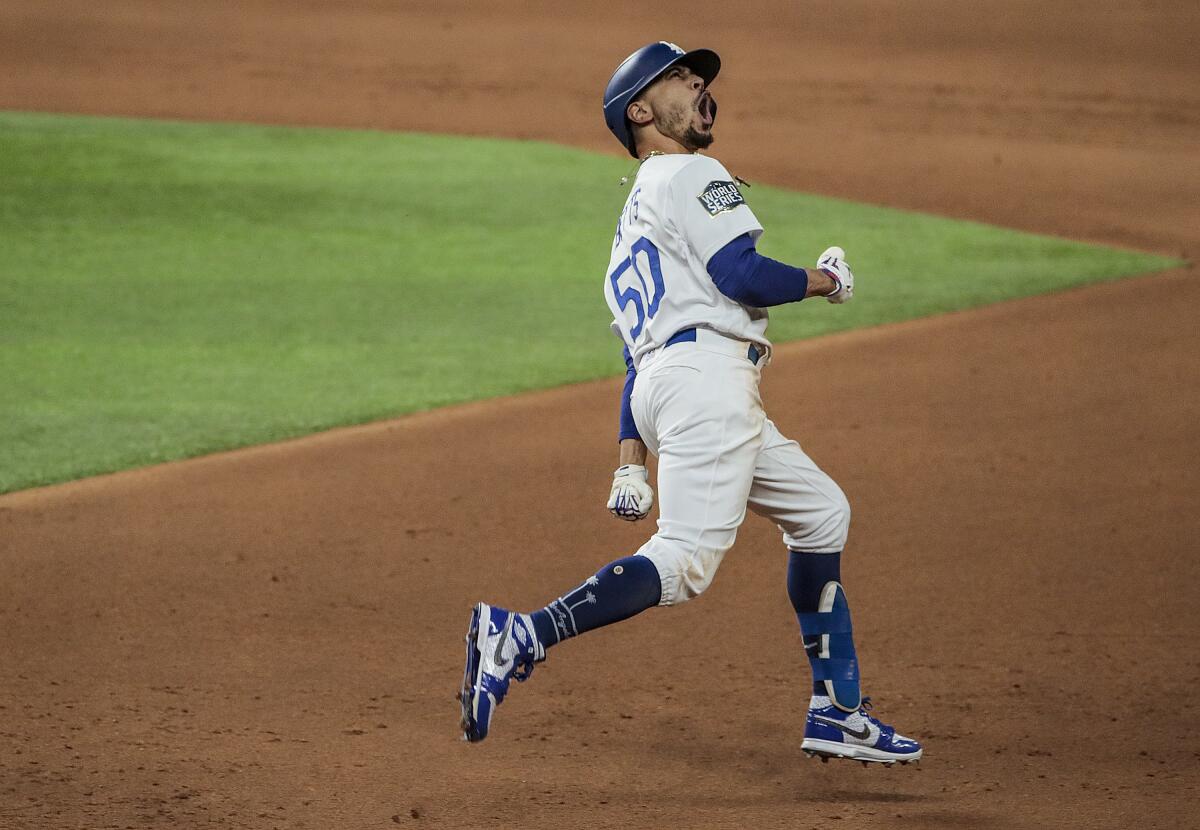
The Dodgers had the best regular-season record in baseball, and their 43-17 mark was on pace for a staggering 116-46 record over 162 games. They began the postseason with five consecutive wins and finished it with a 13-5 record. Because a best-of-three wild card series was used for the first time, the 13 postseason wins were the most in baseball history.
A series-by-series look at how the Dodgers won their first World Series title since 1988 this season.
WILD-CARD SERIES
DODGERS 2, BREWERS 0
TIMES DODGERS SCORED: 7
TIMES BREWERS SCORED: 2
Playing in a vacant Dodger Stadium for the last time this year, the Dodgers dispatched the Brewers, outscoring them 7-2 in a two-game sweep. They never trailed in the series, but the offense was stifled by Milwaukee’s pitching. Collectively, the Dodgers batted .207 with a paltry .292 on-base percentage. Mookie Betts made the difference, slicing three doubles and driving in three runs to begin his Dodger postseason career with a splash. Corey Seager was relatively quiet in the series, but he slugged the first of his eight postseason homers in Game 1.
Clayton Kershaw stole the show in the series finale. He scattered three hits over eight scoreless innings and retired 12 of his final 13 batters. When he walked a batter in his final inning, he quickly picked him off first base. In arguably his finest postseason performance to date, Kershaw racked up 13 strikeouts, a postseason high, with the help of a slider that generated an astonishing 20 swings-and-misses.
The unreliability of closer Kenley Jansen reared its head in the ninth inning of Game 1. His eight cutters averaged 88 mph, a significant drop from his 91-mph regular-season average. One of the pitches was clocked at 86 mph. After Jansen stranded the batter he walked with two outs, manager Dave Roberts said Jansen’s pitches “lacked teeth.” The performance paved the way for the Dodgers’ retreat from Jansen’s closing role.
In the same game, Julio Urías emerged as a formidable bullpen option after he entered in relief of Walker Buehler, who pitched through blister issues. Despite pitching with runners on base in each of his three innings, Urías didn’t yield a run.
Complete coverage of the Dodgers winning their first World Series championship since 1988 after defeating the Tampa Bay Rays in the 2020 World Series.
DIVISION SERIES
DODGERS 3, PADRES 0
TIMES DODGERS SCORED: 23
TIMES PADRES SCORED: 9
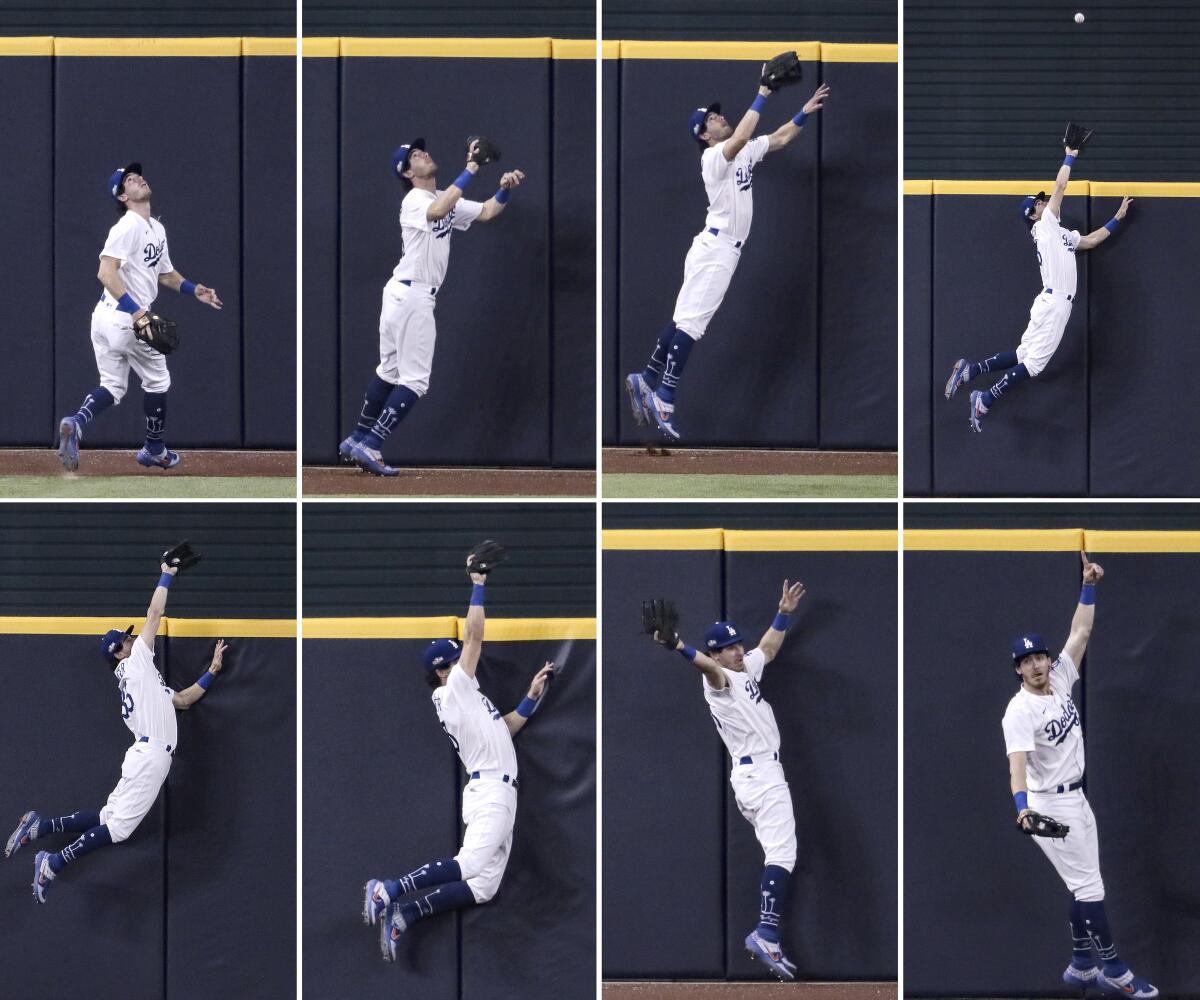
The Dodgers moved to Arlington, Texas, where they expected their offensive production to be sapped further because of Globe Life Field’s spacious dimensions. They were a homer-happy club in the regular season, leading baseball with 118 and scoring more than half their runs via the long ball.
They proved they could manufacture offense without putting balls over the fence. They outscored the Padres 23-9 with the help of just one home run — Cody Bellinger’s first-pitch solo homer in the fourth inning of Game 2.
On all other occasions, the Dodgers relied on their legs. Bellinger, for instance, beat an errant two-out throw as his team’s first run of Game 1 scored in the fifth inning. Mookie Betts broke up the Padres’ no-hit bid in the next frame with a one-out double. He sparked a four-run rally that featured a sacrifice fly, Max Muncy’s double, two weak singles and a run on a wild pitch.
Everyone from the World Series Game 6 starting lineup except Justin Turner returns, and the Dodgers have several more young potential stars on the horizon.
Corey Seager’s breakout postseason got its start in this series. He went four for 11, walked three times and drove in three runs.
Bellinger had five RBIs in the series, but arguably his most important contribution was robbing Fernando Tatis Jr. of a home run. The Padres’ young star clobbered a pitch that seemed destined to become a go-ahead shot in the seventh inning of Game 2. But Bellinger hauled it back with a perfectly timed jump at the center-field fence.
Julio Urías’ audition for an eventual playoff start continued to go well. Called in to scuttle the Padres’ bases-loaded rally with two outs in the second inning of Game 3, he struck out Tatis. He pitched another 4 2/3 innings without giving up an earned run. The Padres’ scored once on a balk but were otherwise strangled by the former teenage phenom. Urías struck out six and gave up just one hit.
CHAMPIONSHIP SERIES
DODGERS 4, BRAVES 3
TIMES DODGERS SCORED: 39
TIMES BRAVES SCORED: 33
Playing in front of fans for the first time since spring training, the Dodgers were pushed to the brink of elimination, manhandled by a group of inexperienced starters who pitched to a 2.58 ERA and were 8-1 in the Braves’ first nine postseason games. They couldn’t even turn the tide after dealing Atlanta an embarrassing 15-3 defeat in Game 3. They lost in Game 4 to fall to a three-games-to-one series deficit.
But the Dodgers’ depth and resilience shone as the teams played seven games in seven days. The Dodgers won the next three, coming from behind in two games, to clinch their third World Series berth in four years.
Corey Seager, Mookie Betts, Cody Bellinger, Justin Turner and Kiké Hernández willed the pennant into existence. So did Walker Buehler, who struck out 11 and gave up just one run in 11 innings despite issuing five walks, and Will Smith, whose three-run homer erased the Dodgers’ Game 5 deficit.
Seager set NLCS records with his bat, clobbering five homers and driving in 11 runs.
Bellinger delivered the winning blast in Game 7, his mammoth solo shot in the seventh inning breaking the deadlock created by Hernández’s pinch-hit solo shot in the sixth.
Betts made insane plays in right field look routine. In Game 5, he lunged for a shoestring catch of a fly ball then hefted an on-target throw to retire at the plate Marcell Ozuna, who failed to tag up at third base. The next night, he robbed Ozuna of an extra-base hit with a leaping grab on the warning track. In Game 7, Betts brought back what would have been a homer by Freddie Freeman to hold the Braves’ advantage to one run in the fifth inning.
Turner also flashed his athleticism in the series finale. On the same fourth-inning play, he extended his body like Superman to prevent the Braves’ lead runner scoring from third base. He then turned to throw out Austin Riley trying to advance to third base.
How the Dodgers went from a team in shambles mired in bankruptcy to a World Series-winning club in 10 years is a testament to their ownership.
WORLD SERIES
DODGERS 4, RAYS 2
TIMES DODGERS SCORED: 32
TIMES RAYS SCORED: 22
Decades of frustration were shelved Oct. 27. The Dodgers clinched their first World Series title since 1988 three days after suffering a nightmarish Game 4 defeat in the ninth inning, when Chris Taylor’s misplay of a base hit to center led to bench player Brett Phillips airplaning his arms in the outfield as the Rays celebrated a walk-off victory.
The decisive Dodgers’ victory in Game 6 seemed inevitable as soon as Rays manager Kevin Cash lifted ace Blake Snell, who had been working on a shutout, with two out in the sixth inning. So many other things went right for the Dodgers.
Clayton Kershaw shook the ghosts of Octobers past. While he cruised to the top of the record books in postseason strikeouts, he pitched six innings of one-run, two-hit ball in Game 1 and yielded two runs in 5 2/3 innings in Game 5. His last victory put the Dodgers one away from lifting a trophy.
Corey Seager was pivotal, earning MVP honors nine days after receiving the same award in the NLCS. He went eight for 20 with two homers, five RBIs, six walks and four strikeouts against Tampa Bay. He also stole a base and scored seven runs.
Sports agent Scott Boras is a proponent of having the World Series at a neutral site, but players on the Dodgers and Tampa Bay Rays are not fans of it.
Max Muncy completed his productive postseason at the plate with a series-high six RBIs. Mookie Betts slugged two home runs, his last blast providing a welcome cushion in the eighth inning of Game 6. Before testing positive for the coronavirus and departing what could be his final game as a Dodger in the eighth inning, Justin Turner produced a 1.066 OPS and scored five of the Dodgers’ 32 runs in the series.
Three days after a start, Julio Urías reprised his role from the NLCS, closing out the final innings of a clinching victory. He retired the Rays’ final seven batters of the season in order. Moments after he unleashed a 97 mph strike to the inner edge of Willy Adames’ zone, Urías squatted over the mound, unleashing a yell as he secured the final out of the World Series.
More to Read
Are you a true-blue fan?
Get our Dodgers Dugout newsletter for insights, news and much more.
You may occasionally receive promotional content from the Los Angeles Times.
